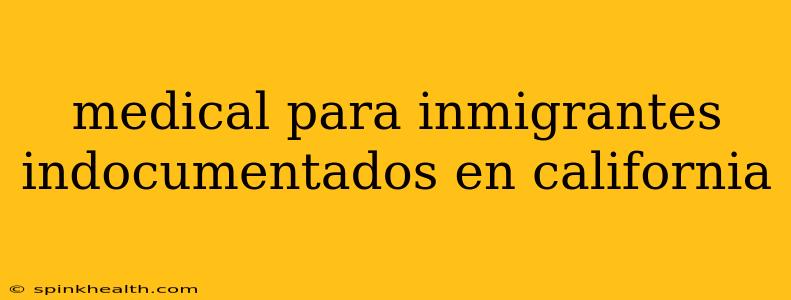California, a state known for its progressive policies, offers a complex landscape of healthcare access for undocumented immigrants. This isn't a simple yes or no answer; the reality is nuanced and depends on several factors, including income level, age, and specific medical needs. Let's unravel the intricacies of this vital topic together.
My name is Dr. Elena Ramirez, and I've dedicated my career to advocating for equitable healthcare access. I've witnessed firsthand the challenges undocumented immigrants face in navigating the Californian healthcare system. This guide draws on my personal experience and extensive research to offer a comprehensive overview.
What Healthcare Options Exist for Undocumented Immigrants in California?
This is a crucial question, and the answer isn't a single program but a collection of resources. Many undocumented immigrants rely on a combination of these options:
-
Federally Qualified Health Centers (FQHCs): These community health centers offer comprehensive primary and preventive care services on a sliding fee scale, meaning the cost is adjusted based on income. Undocumented immigrants can access these crucial services regardless of their immigration status. This is often the cornerstone of care for many. Think of them as the "anchor" of the healthcare system for this population.
-
County Hospitals and Clinics: Each county in California has its own system of public hospitals and clinics. These often offer emergency care and some level of outpatient services, sometimes on a sliding fee scale. Access varies significantly depending on the county's resources and policies.
-
Emergency Rooms: While costly, emergency rooms are obligated to provide care regardless of immigration status. This is crucial for life-threatening situations, but it's important to remember that this is not a sustainable solution for ongoing medical needs.
-
Charitable Clinics and Organizations: Many faith-based organizations and non-profits offer free or low-cost medical care. These resources can be lifelines, but they're often limited in capacity and may have waitlists.
How Can Undocumented Immigrants Pay for Medical Care?
The financial burden of healthcare is a significant barrier. Strategies to address this include:
-
Sliding Fee Scales: As mentioned above, many FQHCs and county clinics operate on a sliding fee scale, making care more affordable based on income.
-
Financial Assistance Programs: Some hospitals and clinics offer financial assistance programs to patients who cannot afford their medical bills. These programs often require extensive documentation and application processes.
-
Medi-Cal for Qualified Individuals: While undocumented adults are generally not eligible for Medi-Cal (California's Medicaid program), some children and pregnant women may qualify. This underscores the critical need to seek information on eligibility based on individual circumstances.
-
Community Fundraising and Support: Many communities rally to assist their members with medical expenses through fundraising efforts and charitable donations.
What are the Legal Rights of Undocumented Immigrants Regarding Healthcare in California?
Emergency medical services are a legal right, regardless of immigration status. This means that hospitals must provide necessary emergency care, and patients cannot be denied treatment on the basis of immigration status. However, access to non-emergency care is more complicated and dependent on the resources available and the individual's financial situation.
Are there Specific Programs for Children and Pregnant Women?
Yes, children and pregnant women may have more access to care through programs such as Medi-Cal, depending on specific eligibility criteria. It is crucial to explore these options and seek guidance to determine eligibility.
Where Can Undocumented Immigrants Find More Information and Resources?
Navigating the system can be overwhelming. It's essential to seek assistance from:
-
Local community organizations: Many non-profits specialize in assisting undocumented immigrants with healthcare access.
-
Immigrant rights groups: These organizations often provide comprehensive information and referral services.
-
FQHCs and county health departments: They can offer guidance on available programs and services.
The healthcare landscape for undocumented immigrants in California is constantly evolving. Staying informed, seeking guidance, and understanding the resources available is crucial to accessing the vital medical care everyone deserves. Remember, your health matters, and there are resources available to help you navigate this complex system.

